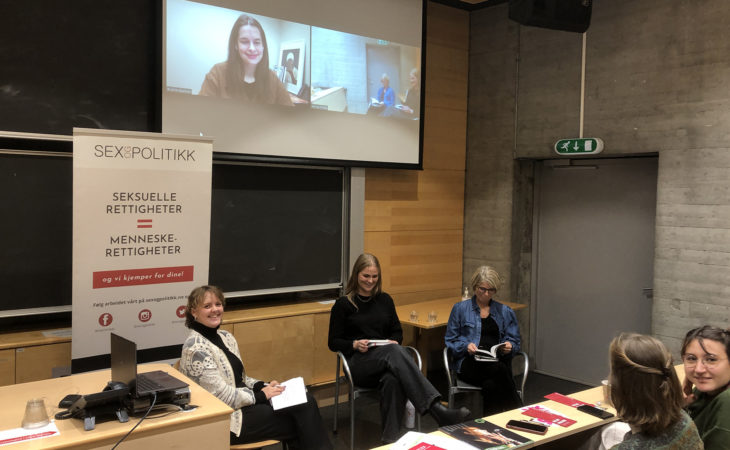A woman is killed every eleventh minute by her partner

As a part of the global campaign 16 days of activism against gender based violence Sex og Politikk asks: How can academia contribute to improved sexual rights globally?
As a part of the global campaign 16 days of activism against gender based violence, Sex og Politikk asked the questions: How can research shed light on what is considered to be a shadow pandemic of sexual and gender based violence? How can academia contribute to improved sexual rights globally?
This was done at the University of Agder (UiA) on November 21, in cooperation with author Kristine Bjartnes and the Center for Gender and Equality at UiA, with the financial support from Fokus.
The numbers are not very posetive: In Norway, a recent report from National Centre for Violence and Traumatic Stress Studies, demonstrate that there is an increase in sexual violence. Meanwhile in the global context, one in every three women have been subjected to sexual violence at least once in their lifetime. This does not account for each woman who every eleventh minutes is killed by her partner.
LGBT+ people are also known to be disproportionately affected by sexual and gender-based violence. This is a human rights violation that undermines health, dignity, security, and autonomy. In addition to hindering women and queer people from safely engaging in politics and democracy in fear of being perpetrated.
The seminar started with an enlightening presentation by Kristine Bjartnes what sexual rights are and how the pandemic affected women’s sexual and reproductive health and rights. This was based on her book «Kvinnehelse i Krisetid» (Women’s Health in Times of Crisis), that was published earlier this year. The book gives both an excellent analysis of sexual rights during the pandemic and an introduction to the history and political struggle for sexual and reproductive rights. This includes addressing sexual and gender-based violence, as was highlighted in Kristines presentation. A separate chapter especially addresses effects of the recent Covid-19 pandemic and lockdown, where sexual and gender-based violence increased.
It followed the consequences of the Covid-19 pandemic like a shadow which is how it got its name “the Shadow Pandemic”. Kristine has previously worked at Sex og Politikk and is an expert on sexual and reproductive health and rights – often shortened to SRHR. She has also previously worked with SAIH, who is here with us today. Kristine currently lives in New York where she continues her commitment for sexual rights.
Mina Strand Fjeldheim invited Hanne Haaland and Henriette Johnstone to join for at panel talk with Kristine. Hanne Haaland is an associate professor in the department of global development and planning, where she has been working on gender and development. She has experience from an EU funded project focusing on women’s health through work with female genital schistosomiasis. As well as partaking in a NORHED project focusing on how we educate on gender in Norway, Tanzania, and Uganda. Henriette Johnstone is the vice president in SAIH (Norwegian Students and Academics International Assistance Fund).
An organization with a strong focus on academic freedom and working for a more just society. SAIH has cooperations with partners countries in Latin-America, Southern Africa, and Asia. In 2020, the organization published a report on the Anti-Gender movement and its effects on queer people and academic freedom, including several case studies as for example from South-Africa, the details of this report was especially highlighted in the panel discussion.
Hanne Haaland emphasised that sexual rights are about our everyday lives – all our lives. Moving forward there is a need for more cooperation between the different academic disciplines and between researchers and practitioners. Henriette Johnstone talked about the anti-gender movement, and the need to meet their arguments with research based and clear counter arguments.
Both Hanne and Henriette emphasised that knowledge and research is context based. It matters who carries out the research and how knowledge production is a part of national and local settings.
Mina asked the panel: Should the starting point for new research on sexual rights be to counteract the anti-gender narrative? Or should new research be based on measures for realising good sexual health and sexual diversity? What are your suggestions for further research and research programs on sexual rights? Hanne Haaland, Henriette Johnstone, and Kristine Bjartnes complemented each other in their answers.
All research on sexual rights is important. It is key to counter act the anti-gender movements arguments by sound arguments based on research. It is also key to continue researching sexual and gender-based violence and how to reduce this continuous pandemic. There is a need to generate the necessary political will to end this violence, and knowledge is key to enable this.
In Norway, Fokus coordinates this campaign and has an ongoing petition everyone is invited to join on digital violence against women.
